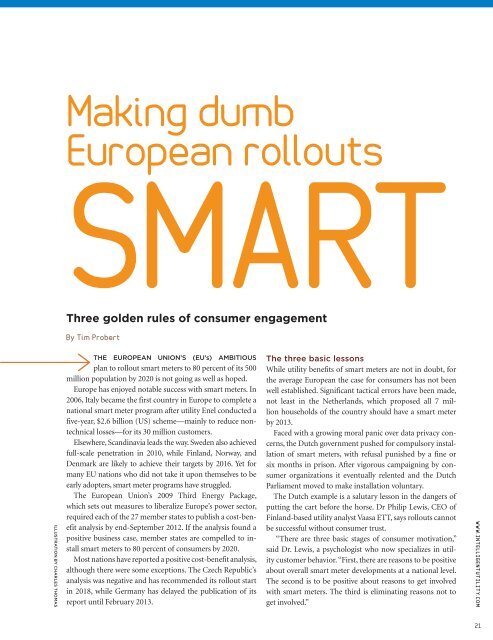Intelligent Utility Jan-Feb 2013
Intelligent Utility Jan-Feb 2013
Intelligent Utility Jan-Feb 2013
Create successful ePaper yourself
Turn your PDF publications into a flip-book with our unique Google optimized e-Paper software.
ILLUSTRATION BY CHARLES THOMAS<br />
Making dumb<br />
European rollouts<br />
SMART<br />
Three golden rules of consumer engagement<br />
By Tim Probert<br />
THE EUROPEAN UNION’S (EU’s) AMBITIOUS<br />
plan to rollout smart meters to 80 percent of its 500<br />
million population by 2020 is not going as well as hoped.<br />
Europe has enjoyed notable success with smart meters. In<br />
2006, Italy became the first country in Europe to complete a<br />
national smart meter program after utility Enel conducted a<br />
five-year, $2.6 billion (US) scheme—mainly to reduce nontechnical<br />
losses—for its 30 million customers.<br />
Elsewhere, Scandinavia leads the way. Sweden also achieved<br />
full-scale penetration in 2010, while Finland, Norway, and<br />
Denmark are likely to achieve their targets by 2016. Yet for<br />
many EU nations who did not take it upon themselves to be<br />
early adopters, smart meter programs have struggled.<br />
The European Union’s 2009 Third Energy Package,<br />
which sets out measures to liberalize Europe’s power sector,<br />
required each of the 27 member states to publish a cost-benefit<br />
analysis by end-September 2012. If the analysis found a<br />
positive business case, member states are compelled to install<br />
smart meters to 80 percent of consumers by 2020.<br />
Most nations have reported a positive cost-benefit analysis,<br />
although there were some exceptions. The Czech Republic’s<br />
analysis was negative and has recommended its rollout start<br />
in 2018, while Germany has delayed the publication of its<br />
report until <strong>Feb</strong>ruary <strong>2013</strong>.<br />
The three basic lessons<br />
While utility benefits of smart meters are not in doubt, for<br />
the average European the case for consumers has not been<br />
well established. Significant tactical errors have been made,<br />
not least in the Netherlands, which proposed all 7 million<br />
households of the country should have a smart meter<br />
by <strong>2013</strong>.<br />
Faced with a growing moral panic over data privacy concerns,<br />
the Dutch government pushed for compulsory installation<br />
of smart meters, with refusal punished by a fine or<br />
six months in prison. After vigorous campaigning by consumer<br />
organizations it eventually relented and the Dutch<br />
Parliament moved to make installation voluntary.<br />
The Dutch example is a salutary lesson in the dangers of<br />
putting the cart before the horse. Dr Philip Lewis, CEO of<br />
Finland-based utility analyst Vaasa ETT, says rollouts cannot<br />
be successful without consumer trust.<br />
“There are three basic stages of consumer motivation,”<br />
said Dr. Lewis, a psychologist who now specializes in utility<br />
customer behavior. “First, there are reasons to be positive<br />
about overall smart meter developments at a national level.<br />
The second is to be positive about reasons to get involved<br />
with smart meters. The third is eliminating reasons not to<br />
get involved.”<br />
WWW.INTELLIGENTUTILITY.COM 21















![View From the Trenches [PDF]](https://img.yumpu.com/18854438/1/190x252/view-from-the-trenches-pdf.jpg?quality=85)
